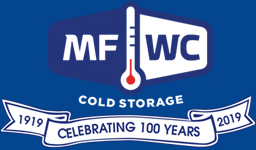In difficult times like these during the COVID-19 pandemic, it’s especially important to maintain global access to essential services. From medical support to food security, every community needs to have its basic needs met. When it comes to continued support of the global food processing and distribution industry, implementing internationally approved food safety practices is critical. On a daily basis, as well as in the long term, food safety standards are the first line of defense against foodborne diseases and other compromises to food quality. At Minnesota Freezer Warehouse Company (MFWC), we are committed to meeting food safety standards and providing continued comprehensive quality. As a cold storage warehouse in Austin, MN, MFWC is part of a global food distribution network that relies on an unbroken cold chain from farm to shelf.
A large part of maintaining a global food chain is the support of reliable, quality exportation of goods internationally. To protect the standards of the national and global food safety regulations, the U.S. Department of Agriculture (USDA) established strict guidelines for export eligibility in the form of Food Safety and Inspection Services (FSIS). The FSIS takes responsibility for the inspection of imported and exported food products, including meat, poultry, and egg products.
With the state-of-the-art facilities available through our warehouse locations, MFWC is able to offer customers full export services to FSIS-approved countries. A full list of countries and certifications can be found on the USDA website. The role of the FSIS certification process is to maintain quality in:
- General sanitation control: This includes all packaging and transport facilities and equipment, packing materials and methods, employee protection, climate control, transit times, and more. Basic sanitation standards and product specific controls are a critical part of this guideline.
- Animal disease control: Meat, poultry, and egg products can carry animal diseases or develop foodborne contamination without proper inspection and quality control. Meeting the guidelines of the USDA FSIS is key to preventing global spread of dangerous diseases.
- Control of the slaughter and processing: Various regulations must be met to prevent undue animal hardship and cruelty, cross-contamination, and improper slaughtering or other processing techniques. Countries meeting FSIS guidelines are establishing positive practices for animal handling and safe imports/exports.
- Control of residuals: All types of food processing generate some residuals, whether that means pulp and seeds or intestines and other offal. Control for the unused residuals of all food production processes must be incorporated into quality inspections and transport services.
- Enforcement of control: A large part of the USDA’s FSIS is its enforcement of all guidelines’ consequently, to ensure countries we export to as a cold storage warehouse are meeting best practices, MFWC exports only to FSIS-approved countries.
Our export services for fresh, dried, and frozen meat, poultry, and egg products continue to meet global food safety standards because we work directly with FSIS-approved countries. To learn more about our services as a cold storage warehouse in Austin, MN, contact MFWC at (507) 373-1477 or info@mfwc-cold.com.
